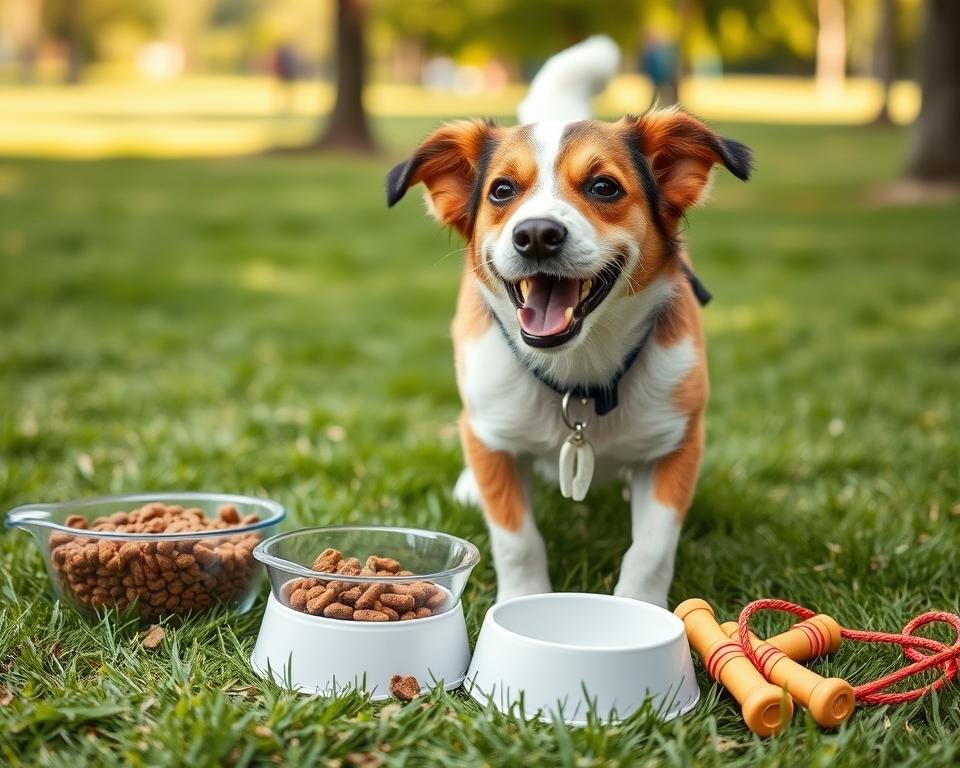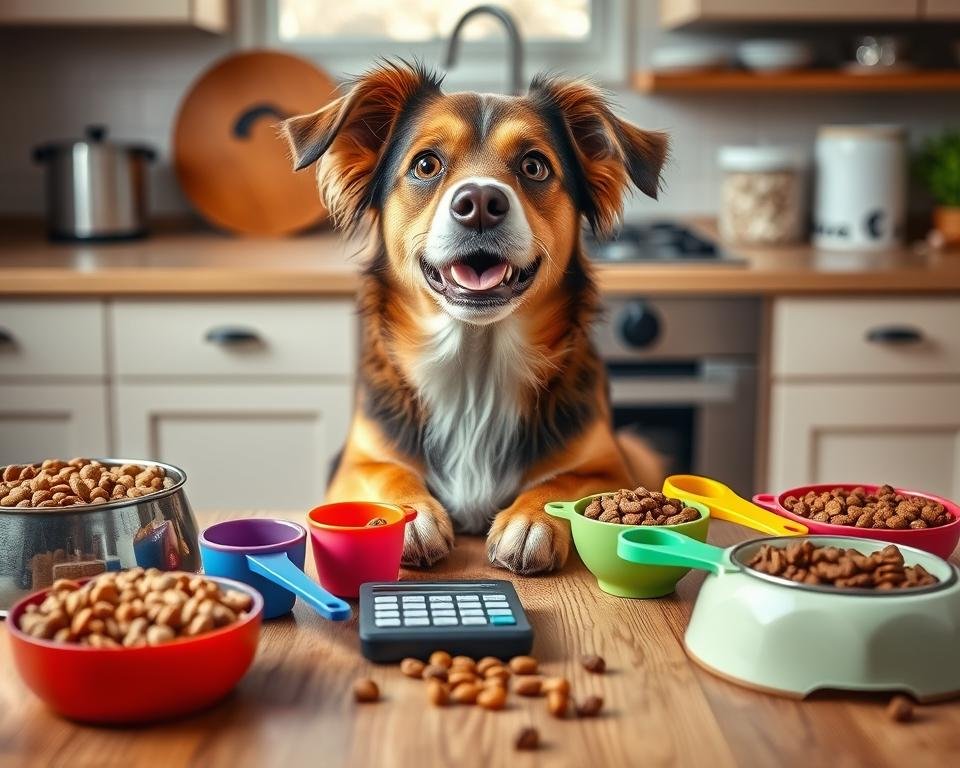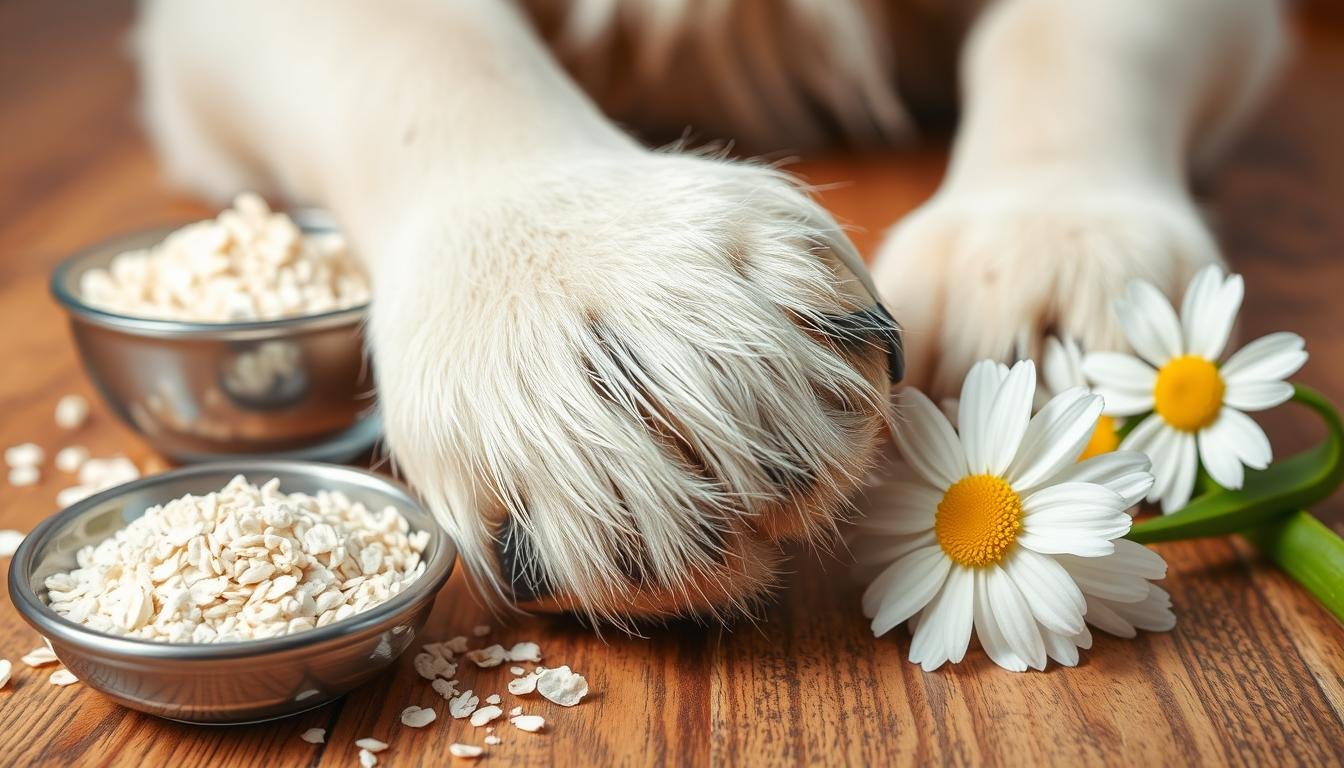Calories measure the energy in food, also known as kilocalories (kcal). They are key for a dog’s energy, coming from fats, proteins, and carbs. Not getting enough calories can lead to weight loss, while too many can cause weight gain. It’s vital to find the right amount for a dog’s health and long life.
Finding out how many calories a dog needs can be tricky. It depends on their breed, size, age, and how active they are. But knowing the general calorie needs is a good start for pet owners. It helps make sure their dogs get the right food.
Understanding Calories and Their Importance for Dogs
Calories are the fuel that powers a dog’s body. They come from fats, proteins, and carbs in their food. Keeping the right calorie balance is key for dogs. It helps them stay healthy, grow, and have energy for daily activities.
Dogs need different calories based on their breed, size, age, and how active they are. For instance, a 50-pound neutered male dog might need 874 to 1,456 dog calories per day. To figure out a dog’s calorie needs, use a calorie calculator dog or talk to a vet. They can help because each dog is different.
Knowing how important calories are for dogs is vital for their health. The right amount of calories helps dogs stay at a healthy weight. It also supports their growth and gives them the energy to thrive.
“Proper calorie intake is key for a dog’s health and well-being. It fuels their body and supports their daily activities.”
Whether you’re new to dog ownership or have had a dog for years, learning about canine calorie needs is important. Using the right dog calories per day calculator can greatly improve your dog’s health and happiness.
Factors Affecting Daily Calorie Requirements
Finding the right calorie intake for your dog is key for their health. Breed, size, age, and activity level all play a part in how many calories a dog needs each day.
Breed and Size Considerations
The size and breed of your dog affect their calorie needs. Big dogs like Great Danes or Saint Bernards need more calories per day than small dogs like Chihuahuas or Pomeranians. A 10 lb dog needs 200 to 275 calories, while a 20 lb dog needs 325 to 400 calories.
Dogs weighing 50 lbs need 700 to 900 calories, and 70 lb dogs need 900 to 1050 calories. For a 90 lb dog, they need 1100 to 1350 calories daily.
Age and Life Stage Impact
A dog’s age and life stage also matter for their calorie requirements. Puppies and pregnant or nursing females need more calories for growth and milk production. Senior dogs or those who are less active might need fewer calories.
It’s important to talk to your vet to figure out the right calorie intake for your dog’s age and life stage.
Activity Level Variations
The activity level of your dog is also key in figuring out their daily calorie needs. Dogs that are very active, like working or sporting breeds, might need twice as many calories as less active dogs. To calculate a dog’s Resting Energy Requirement (RER), use RER = 70 * (kg Bodyweight)^0.75.
Then, adjust this value based on your dog’s activity level. For senior or inactive dogs, use 1.1x. For puppies under 4 months or very active dogs, use 3x.
Understanding these factors helps ensure your dog gets the right nutrition. This keeps them healthy and active.
Using a Kcal Calculator for Dogs
Finding the right daily calories for your dog is key to their health. A kcal calculator for dogs can help figure out how many calories they need each day.
To start, you’ll need to change your dog’s weight from pounds to kilograms. Next, you’ll find their Resting Energy Requirement (RER). This is the number of calories they need to stay at their current weight. You’ll then add multipliers based on their age, activity level, and weight goals to find their total daily calories.
Online calorie calculators for dogs make this easier. They give you a quick, personalized calorie plan. But, it’s best to talk to your vet for the most accurate advice. They can tailor the plan to your dog’s specific needs.
Our research shows that dogs’ calorie needs change with their size and weight:
- 10 lbs dog: 200 to 275 calories
- 20 lbs dog: 325 to 400 calories
- 50 lbs dog: 700 to 900 calories
- 70 lbs dog: 900 to 1050 calories
- 90 lbs dog: 1100 to 1350 calories
Using a good kcal calculator for dogs or getting advice from your vet ensures your dog gets the right calories. This helps them stay healthy and happy.
Body Condition and Weight Management
Keeping a dog at the right weight is key for their health. Calorie calculator dog tools help figure out how many calories a dog needs. Knowing when to feed more or less helps keep dogs in top shape.
Ideal Weight Assessment
The right weight for a dog depends on their breed, size, and body condition score (BCS). The calorie calculator dog gives a weight range based on these factors. Regular weigh-ins and BCS checks help keep dogs at a healthy weight.
Signs of Under and Overfeeding
Not enough food can make a dog lose weight and feel tired. Too much food can lead to obesity and health problems. Owners should watch their dog’s weight and energy to make sure they’re eating right.
Weight Loss and Gain Monitoring
To lose weight, a dog might need 70-80% of their Resting Energy Requirement (RER). For gaining weight, adding high-quality, calorie-rich food and exercise is key. Regular weighing and adjusting food amounts are vital for managing weight.

“Maintaining a healthy weight is not just about appearance; it’s about ensuring your dog’s overall well-being and longevity.” – Dr. Jane Doe, Veterinarian
Special Dietary Considerations
Some dogs need special diets because of health issues, age, or lifestyle. Pregnant or nursing dogs need more calories to support their babies or milk. On the other hand, older dogs might need fewer calories because they move less and have less muscle.
Dogs with diabetes, kidney disease, or food allergies might need special diets. A vet can help adjust their calorie intake and nutrients. Tools like the dog calories per day and calorie calculator can help, but always get a vet’s advice.
Every dog is different, so it’s important to watch their health closely. Regular vet visits and tailored diets are key to keeping them healthy and happy.



